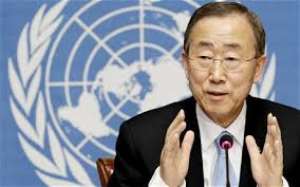
The United Nations has called on world leaders to do everything possible to end obstetric fistula,which mostly affect more than two million poor and most marginalized women and girls in the world.
.
Even though it is preventable and treatable,the UN Secretary General Ban Ki-Moon was unhappy that the condition still existed with between 50,000 and 100,000 new cases every year, causing even greater suffering and isolation to those who lived with it.
In a statement issued at the UN Headquarters in New York on May 23, 2016 to mark International Day to End Obstetric Fistula, he observed that the persistence of fistula in some countries and regions is an indicator of very poor access to quality maternal health services.
"To end it, we must strengthen health systems and address broader development and human rights issues affecting women and girls: poverty, gender inequality, early marriage, early childbearing, and lack of education",Mr. Ban Ki-Moon he stated.
At present rates,the UN Secretary General said " most will die without ever receiving treatment – a heartbreaking and unacceptable situation", insisting that "fistula has virtually been eliminated in most high and middle income countries around the world, so we know that it can be eliminated in every country".
In this vein, he urged world leaders to use the momentum of the Sustainable Development Goals together with strong political leadership, accelerated investment and action, and passionate and committed champions, to achieve the historic and transformative goals for sustainable development.
"All these aims are part of the 2030 Agenda for Sustainable Development, agreed unanimously by world leaders in September 2015. Goal 1 on ending poverty, Goal 3 on healthy lives, Goal 5 on gender equality and Goal 10 on reducing inequality should make an enormous contribution to preventing and ending fistula", the UN Secretary General added .
There have been great progress on maternal and newborn health in recent years, he noted, pointing out that "more than 70,000 women and girls have had their fistulas repaired since UNFPA and its partners launched the global Campaign to End Fistula in 2003".




 2024 elections: A vote for Mahama will turn Ghana's education system upside down...
2024 elections: A vote for Mahama will turn Ghana's education system upside down...
 Dumsor: NPP will be punished in election 2024 if gov't doesn't address current s...
Dumsor: NPP will be punished in election 2024 if gov't doesn't address current s...
 There is a clear need for the downstream petroleum audit services provided by SM...
There is a clear need for the downstream petroleum audit services provided by SM...
 Akufo-Addo directs GRA, Finance Ministry to renegotiate deal with SML
Akufo-Addo directs GRA, Finance Ministry to renegotiate deal with SML
 Kofi Bentil’s love, support for Bawumia will never represent IMANI – Franklin Cu...
Kofi Bentil’s love, support for Bawumia will never represent IMANI – Franklin Cu...
 NPP outperforms NDC in health infrastructure in Ashanti Region — LIPS report
NPP outperforms NDC in health infrastructure in Ashanti Region — LIPS report
 Critics fear Togo reforms leave little room for change in election
Critics fear Togo reforms leave little room for change in election
 Current power outages purely due to mismanagement – Minority
Current power outages purely due to mismanagement – Minority
 ECG hoists red flag to fight Ashanti Regional Minister over arrest of General Ma...
ECG hoists red flag to fight Ashanti Regional Minister over arrest of General Ma...
 Mahama’s 24hr economy will help stabilise the cedi; it’s the best sellable polic...
Mahama’s 24hr economy will help stabilise the cedi; it’s the best sellable polic...
